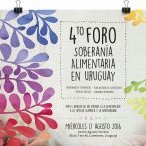English · Español

16 August 2016 | Chronicles | Agroecology | Forests and biodiversity | Climate Justice and Energy | Food Sovereignty
Discussions about agroecological transition, legal advances and rural education
Download: MP3 (3 Mb)
A new edition of the Food Sovereignty Forum is taking place this week in Uruguay with food sovereignty as a right of the people to adequate food, climate justice and the respect and defense of biodiversity against the homogenization promoted by agribusiness.
Organized by the Native Seeds Network of Uruguay, the Network of Rural Women Groups and Friends of the Earth Uruguay, this will be the fourth edition of the Forum, which gathers the different perspectives of social organizations, state institutions and education centers around the concept and principle of Food Sovereignty.
The meeting, which will take place 40 kilometers from Montevideo, capital city of the country, will aim to share information about the contents of a legal bill that will be considered by Parliament in the following weeks. The bill establishes the creation of a National Agroecology Plan.
Also, the 4th Food Sovereignty Forum will deal with the advances with reference to the implementation of an agroecological transition project for the preservation of the Laguna del Cisne Basin, a source of water for a significant area of the Uruguayan metropolitan area. This transition has been taking place slowly through permanent exchanges with the population of the area, after verifying changes in the quality of water caused by cattle-agricultural exploitation in the basin.
The regulations establish three categories for the territory covered by the Laguna del Cisne basin, where agroproductive, tourism and industrial activities will be limited, excluding intensive cattle farming, manipulation of toxic substances and the use of agrotoxics. Food production in the territories considered "natural rural territories" should take place under agroecological regulations in a transition period.
By limiting some productive models and promoting agroecological actions, the aim is to avoid soil erosion, agrochemical drift towards the water and the building of an agroecological identity in the territory of the Laguna del Cisne basin.
Other experiences that will be part of the forum include the saving and revalorization of native seeds, the genetic improvement of vegetables based on local populations and participatory selection methods, and the access to public lands by organized groups of young people (aldea Avatí) or rural women who produce herbs in a cooperative (Calmañana).
National Agroecology Plan
In parallel, this Forum organized, among others, by Redes-Friends of the Earth Uruguay, will be a reunion for organizations of the Agroecolgical Network of Uruguay, the Latin American Scientific Society on Agroecology (SOCLA), among others, responsible for the promotion of a bill that will be considered by the Uruguayan Parliament soon.
The bill establishes that "in Uruguay, the increasing concern of the citizens for healthy food, free from agrochemicals and GMOs is undeniable. Also, there is an increasing social and environmental demand linked to the quality of water, health and working conditions of the people within the agrifood system. In turn, the depopulation of the rural area and land concentration are some of the challenges for the feasibility of a territorially integrated and socially just project-country. In response to the complexity of these challenges, promoting an agroecological agriculture is an interesting political choice, which so far has been studied widely. Indeed, the agroecological perspective, by recognizing the multifunctional dimensions of agriculture and giving importance to the combination of scientific research with local experiments -technologies and intensive innovations in knowledge, low cost, and easily adaptable by small farmers- enables the advance towards a wide range of goals linked to equitative and sustainable development.
At the 4th Forum, the participants will share information about the current situation of the National Agroecology Plan, as well as the building process and what this implies for the future, stated the organization.
The 4th Food Sovereignty Forum in Uruguay also takes place two decades after the introduction of genetically modified commercial crops in Uruguay, which resulted in the emergence of superweeds, concentration of agricultural income and negative effects on the ecosystems and river basins.








